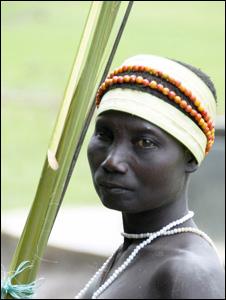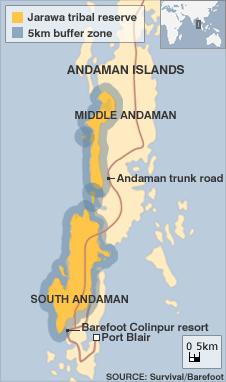India campaign group lobbies for end to Andamans tours
- Published

Jarawas resemble African bushmen <i>(Photos: Survival International)</i>
Aboriginal tribespeople in India's Andamans archipelago are being threatened by tourist safaris run by local tour operators, an indigenous rights organisation has said.
Survival International has urged the operators to stop tours for sightings of the endangered Jarawa tribe.
It says the tours put them at risk of disease as they have little immunity.
The Jarawas - essentially hunter-gatherers - came to the Andamans 60,000 years ago.
Only 320 Jarawas are living today.
'Intruders'
In a statement, Survival International said that four companies promoting "Jarawa tourism" on their websites had stopped doing so after the group wrote to them.

The group says it has now written to eight other travel companies, who it says, continue to promote tours despite the fact that they are "illegal".
In the 1970s, the Andaman trunk road was built, cutting through the 1,000 sq km forest reserve in which the Jarawas live, leading to tourists and settlers coming into their habitat.
There have been demands to close the road, and stop "intruders from trespassing" on tribespeople's land.
The Jarawas are just one of the indigenous tribal groups living in the Indian archipelago of Andaman and Nicobar in the Bay of Bengal.
Short, with dark skin and curly hair, they resemble African bushmen in appearance. Today, however, the tribe is on the verge of extinction.
Tribal rights activists say immediate measures must be taken to prevent any further decline in their numbers.
For that, they say, the Jarawas should be protected from encroachment by tourists, poachers and other outsiders.
Survival says it should be up to the Jarawas to decide how much contact they have with the modern world.
"The point is that if outsiders continue to encroach on their land, including via the road, then contact continues to be imposed upon them, without their having chosen it or having the means to determine its extent and its pace," a spokeswoman said.